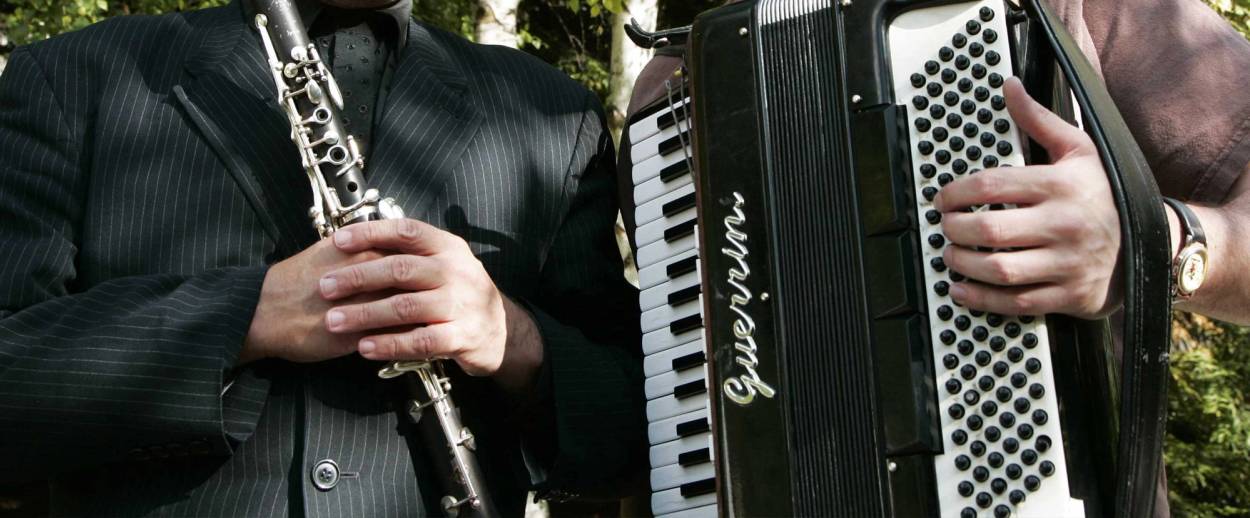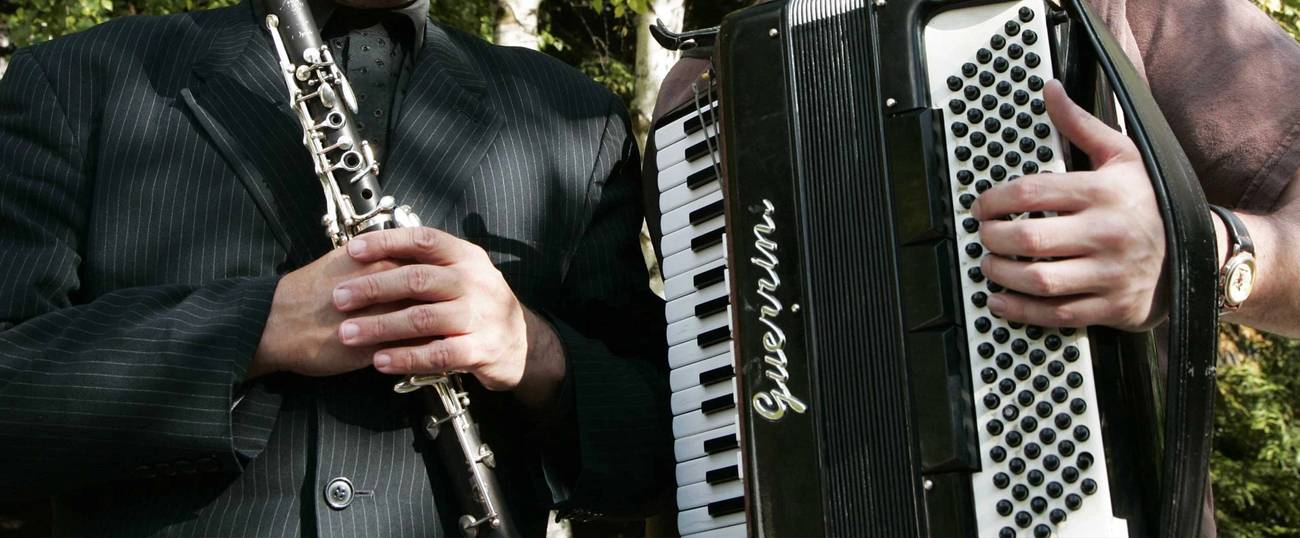From Radiohead to Klezmer
My winding journey through music mirrored my journey of Jewish discovery




Inside a Victorian home on an otherwise quiet street in San Francisco’s Mission district, a bacchanal roared deep into the night, to the tune of our Balkan ensemble blaring rapturous songs of the Old World. When the instruments faded, I dragged a chair to center stage. At my signal, a somber chord droned out of the accordion, setting the tone for the next song. I sat down and, with wine-fueled confidence, launched into a Yiddish spiritual:
“Shnirele perele, gilderne fon/Moshiach ben dovid zitst oybn-on…” (“String of pearls, golden flags/the Messiah, son of David, sits on high…”)
As someone who once listed Radiohead under “Religious Views” on her Facebook profile, singing these words felt more than a little strange. But the melody had stuck with me since I’d learned it a few months prior. So how did I go from worshipping alternative and indie rock to belting out Yiddish folk tunes at house parties? How did this cynical, secular daughter of Soviet Jews learn to embrace the music of her ancestors, storied klezmer musicians of the Pale?
***
According to family lore, my maternal grandmother’s cousin was the late great Miron Polyakin, a prominent Soviet violinist and disciple of the legendary musical pedagogue Leopold Auer. Although Polyakin was renowned in his day—his biography appears in various Jewish encyclopedias, and his performances are well-documented—I know virtually nothing about his personal life or relationship with my family, save what I’ve gathered from research of my own.
For reasons ranging from lack of surviving records to lack of surviving (and able-minded) progenitors, the subject of my family’s roots is what we call in Russian pustoyo mesto—an empty place. Even more baffling is my mother’s vague account that her ancestors were “klezmers” and that at some point, music was “the family business.” That’s about as specific as it gets.
Despite this information void, some vestige of the alleged family business managed to trickle down far enough for me to speculate about its influence on my own life. I can’t say that I grew up in an overtly musical home, but I always felt a musical presence. Before my mother immigrated to New York at 19, she had trained to be a concert pianist in Kiev. Performance was drilled into her from a young age, and throughout my childhood I felt it, quite literally—from the unconscious tapping of her fingers to some imagined melody to her sporadic impromptu living-room recitals.
My mother quit piano shortly after immigrating in the late 1970s, figuring she would put her hands to better use as a typist and stenographer. By the time I was born, music was a past life for her—but for me, it became a veritable life source. Growing up, music provided respite from reality and a means to retreat into the comforts of my internal world. I listened intently and endlessly, developing a distinct penchant for tunes in minor keys. Whether this was a result of any ethnic musical influences or simply the predilection of a melancholy kid is anyone’s guess—but by the end of college, I was worshipping an angst-ridden trinity: Radiohead, Fiona Apple, and Elliott Smith.
Performance was also essential to my (however introverted) being. I had sung in choirs, a capella groups, and myriad vocal ensembles since kindergarten, but didn’t perform solo much until I picked up the guitar at 19—around the same time I started attending Russian Club meetings at Brandeis (later, I transferred to NYU). It was there that I first learned of the watershed movement my parents had missed out on: While they were busy coming of age and assimilating in America, perestroika was taking hold in the Soviet Union, ushering in the golden age of Russian rock.
Soon after my introduction to the world of Kino, Auktyon, and Akvarium came my foray into the Russian music-festival circuit—a thriving subculture with a tangled web of internal politics and history all its own. Here I found a community of musicians who shared, among other idiosyncrasies, my penchant for melodramatic tunes in minor keys. I was absolutely floored by their energy and all-night jam sessions. Many had even brushed shoulders with the likes of Gogol Bordello, which seemed insanely cool to me at the time.
The summer after graduation, I attended as many gatherings as I could, and my Russian improved drastically. I loved feeling part of a community that shared musical interests as well as a cultural code. But for my parents, who had distanced themselves from Russian-speaking culture since fleeing the Soviet Union, my new obsession was somewhat unexpected. In college, my mother had dissuaded me from majoring in Russian studies and my father forbade me to study abroad in St. Petersburg (later, I ended up in Tel Aviv). Of course, this only fueled my curiosity.
I was a bit of an anomaly at festivals, with my American name and accent. But I could sing, and sing I did, eventually joining a bilingual rock sextet that played for three years—until I moved to the Bay Area in search of greener pastures. Disillusioned by New York, I thought the West Coast could offer me something the East Coast never could. And to a great extent, it did.
Those who have lived in the Bay Area will agree: If you have an obscure hobby or interest, there exists a community of people who not only encourage your eccentric pastime but meet weekly to exchange its best practices. I was new to Berkeley, working for a Jewish nonprofit, and vaguely hoping to find an Eastern European music scene. Lo and behold, I found one—but it wasn’t Russian, much less rock. Instead, I unwittingly tapped into (yet another) thriving subculture, one that has been in San Francisco since the 1960s.
The Bay Area Balkan music community is less a scene than a way of life. On any given night of the week, one can attend a Balkan gathering—performance, jam session, dance party—frequented by enthusiasts who mostly are not from Southeastern Europe yet are deeply enamored by its musical traditions. In no time at all, I was hooked. I attended house jams on a regular basis, memorized lyrics in Serbo-Croatian, and even attempted to folk dance unironically. I joined not one but two Balkan groups, including the renowned women’s vocal ensemble Kitka. I scoured YouTube for hours on end, unearthing traditional music from the far reaches of Eastern Europe. I listened to songs in Bulgarian, Romanian, Romani, even Ladino—gravitating further north to Russia and my mother’s native Ukraine, and eventually, rediscovering klezmer.
Growing up, klezmer (the instrumental music tied to Ashkenazi/Yiddish culture) had always felt unbearably fogeyish to me. My exposure to Jewish music was limited to canned versions of “Hava Nagila” and “Heveinu Shalom Aleichem” at Russian restaurants on Brighton Beach. In the Bay Area, however, this changed. First, the fact that the klezmer scene overlapped with the Balkan scene helped me see the genre in a new light. But the real turning point came when I discovered artists like Psoy Korolenko and Daniel Kahn, whose genre-defying lyrics in Yiddish, English, and Russian retold Jewish history in eye-opening ways. Suddenly, Yiddish stopped feeling like the dying language of my grandparents and became incredibly relevant. Listening to punk cabaret versions of radical Yiddish texts made me more excited about my heritage than I had ever been in my adult life. It was as if I had unlocked a missing piece of my cultural identity.
And that’s how I ended up singing “Shnirele Perele” on a Friday night in the Mission.
***
Despite my burgeoning music career in the Bay Area, however, I was depressed and homesick. I missed my family, my rent was exorbitantly high, and I wasn’t quite sure what I was doing with my life. I hated to disappoint my bandmates and friends, but I just couldn’t hack it anymore. So in spring 2017, I left.
I knew I couldn’t go back to my old life without a musical outlet. So before my departure, I reached out to one of my Russian-festival friends and asked him to connect me to the organizers of JetLAG Festival. JetLAG is technically part of the Russian circuit, but distinct for a few reasons: For one, it strives to be multigenre and multicultural, featuring performances ranging from klezmer to reggae. It is also the brainchild of several Russian Jewish visionaries, including Psoy Korolenko.
Culture shock is what happens when you return from a transformative year in Berkeley to living with your parents in Southern Brooklyn. To keep sane, I stayed busy, trekking out to Jersey every so often to meet with Psoy and the rest of the festival crew. Finally, after months of volunteer efforts, I found myself at JetLAG that June.
As I lay in its vast open field, watching the sky and listening to acoustic covers of Soviet rock, Yiddish renditions of American classics, sad Russian romances, and even a few fleeting songs in Ukrainian, I realized something: JetLAG isn’t a Jewish event per se (though many, if not most festivalgoers are Russian-speaking Jews), but it embodies aspects of Jewishness that I most closely identify with. Being an outsider, living in a diaspora, connecting with people over a shared sense of “otherness,” even appreciating tunes in minor keys—these are all essential to my Jewish experience.
Since learning to appreciate Yiddish song, I have happily incorporated a few tunes into my repertoire. This hasn’t made me feel more Jewish than I already did. Rather, it has encouraged me to celebrate and perform culture as the highly complex phenomenon that it is. Parallels in music traditions are among countless indications that Ashkenazi Jews and Slavs share a cultural code. I love the way klezmer intersects with my Russian-speaking heritage, and through music, I strive to present the harmony between seemingly discordant components of one’s identity.
I can’t help but wonder how my ancestors would feel about my casually singing, for instance, Cossack folk songs. They might be perplexed, appalled, or perhaps even amused. The irony is that the musical traditions of their Christian neighbors sparked my now-growing interest in Yiddishkeit. I think of this, and am reminded that our cultures intertwine in inextricably beautiful ways. And to that extent, the more I learn, the more there is to learn.
Like this article? Sign up for our Daily Digest to get Tablet Magazine’s new content in your inbox each morning.
Samantha Shokin is a writer and musician based in Brooklyn.